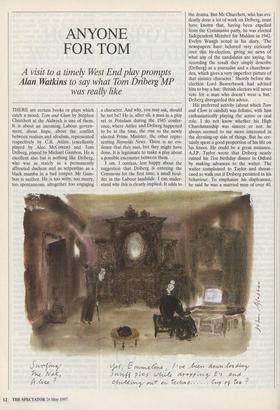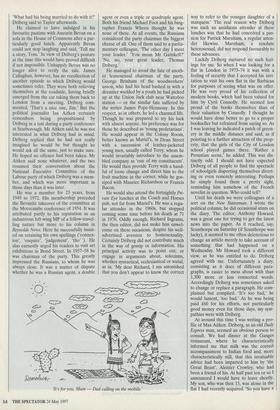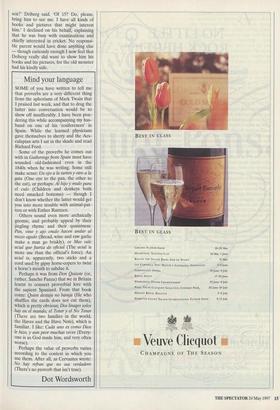ANYONE FOR TOM
A visit to a timely West End play prompts Alan Watkins to say what Tom Driberg MP
was really like
THERE are certain books or plays which catch a mood. Tom and Clem by Stephen Churchett at the Aldwych is one of them. It is about an incoming Labour govern- ment, about hope, about the conflict between realism and idealism, represented respectively by C.R. Attlee (excellently played by Alec McCowen) and Tom Driberg, played by Michael Gambon. He is excellent also but is nothing like Driberg, who was as stately as a permanently affronted duchess and as serpentine as a black mamba in a bad temper. Mr Gam- bon is neither. He is too witty, too merry, too spontaneous, altogether too engaging a character. And why, you may ask, should he not be? He is, after all, a man in a play set in Potsdam during the 1945 confer- ence, where Attlee and Driberg happened to be at the time, the one as the newly elected Prime Minister, the other repre- senting Reynolds News. There is no evi- dence that they met, but they might have done. It is legitimate to make a play about a possible encounter between them.
I am, I confess, less happy about the suggestion that Driberg is entering the Commons for the first time, a small boul- der in the Labour landslide. I can under- stand why this is clearly implied. It adds to the drama. But Mr Churchett, who has evi- dently done a lot of work on Driberg, must have known that, having been expelled from the Communist party, he was elected Independent Member for Maldon in 1942. Evelyn Waugh noted in his diary, 'The newspapers have behaved very curiously over this by-election, giving no news of what any of the candidates are saying. In recording the result they simply describe [Driberg] as a journalist and a churchwar- den, which gives a very imperfect picture of that sinister character.' Shortly before the election Lord Beaverbrook had advised him to buy a hat: 'British electors will never vote for a man who doesn't wear a hat.' Driberg disregarded this advice.
His preferred activity (about which Tom and Clem is candid) was fellatio, with him enthusiastically playing the active or oral role. I do not know whether his High Churchmanship was sincere or not: he always seemed to me more interested in the dressing-up side of things. But he cer- tainly spent a good proportion of his life on his knees. He could be a great nuisance. A.J.P. Taylor wrote that Driberg nearly ruined his 21st birthday dinner in Oxford by making advances to the waiter. The waiter complained to Taylor and threat- ened to walk out if Driberg persisted in his behaviour. To emphasise his displeasure, he said he was a married man of over 40. 'What had his being married to do with it?' Driberg said to Taylor afterwards.
He claimed to have indulged in his favourite pastime with Aneurin Bevan on a sofa in the House of Commons after a par- ticularly good lunch. Apparently Bevan could not stop laughing and said, 'Tell me a story, Tom.' In view of Driberg's posture at the time this would have proved difficult if not impossible. Unhappily Bevan was no longer alive to verify the tale. James Callaghan, however, has no recollection of another episode to which Driberg would sometimes refer. They were both relieving themselves at the roadside, having briefly emerged from the car taking them back to London from a meeting. Driberg com- mented, 'That's a nice one, Jim.' But the political journalist Ian Aitken certainly remembers being propositioned by Driberg in a taxi during a party conference at Scarborough. Mr Aitken said he was not interested in what Driberg had in mind. Driberg replied that he had not really imagined he would be but thought he would ask all the same, just to make sure. He hoped no offence had been taken. Mr Aitken said none whatever, and the two resumed their conversation about the National Executive Committee of the Labour party of which Driberg was a mem- ber, and which was more important in those days than it was later.
He was a member for 23 years, from 1949 to 1972. His membership preceded the Bevanite takeover of the committee at the Morecambe conference of 1954. It was attributed partly to his reputation as an industrious left-wing MP of a fellow-travel- ling nature but more to his column in Reynolds News. Here he successfully insist- ed on retaining his own spellings ('connex- ion', 'enquire', 'judgement', `tho"). He also earnestly urged his readers to visit art exhibitions in Bond Street. In 1957-58 he was chairman of the party. This greatly impressed the Russians, to whom he was always close. It was a matter of dispute whether he was a Russian agent, a double agent or even a triple or quadruple agent. Both his friend Michael Foot and his biog- rapher Francis Wheen thought he was none of these. At all events, the Russians considered the party chairman the biggest cheese of all. One of them said to a parlia- mentary colleague, 'The other day I meet your leader.' You mean Mr Gaitskell?' 'No, no, your great leader, Thomas Driberg.'
He managed to avoid the fate of anoth- er homosexual chairman of the party, George Brinham of the woodworkers' union, who had his head bashed in with a decanter wielded by a youth he had picked up at the Union Jack club near Waterloo station — or the similar fate suffered by the writer James Pope-Hennessy. In this respect, as in others, he led a charmed life. Though he was prepared to try his luck with almost anyone, his preference was for those he described as 'young proletarians'. He would appear in the Colony Room, better known as Muriel's, in Dean Street with a succession of leather-jacketed young men, usually called Terry, whom he would invariably introduce to the assem- bled company as 'one of my constituents'. He would then provide Terry with a hand- ful of loose change and direct him to the fruit machine in the corner, while he gos- siped with Maurice Richardson or Francis Bacon.
He would also attend the fortnightly Pri- vate Eye lunches at the Coach and Horses pub, not far from Muriel's. He was a regu- lar attender in the 1960s, but stopped coming some time before his death at 71 in 1976. Oddly enough, Richard Ingrams, the then editor, did not make him unwel- come on these occasions, despite his well- advertised aversion to homosexuality. Certainly Driberg did not contribute much in the way of gossip or information. His principal activity was to point out, or engage in arguments about, solecisms, whether syntactical, ecclesiastical or social, as in, 'My dear Richard, I am astonished that you don't appear to know the correct It's for you, Mum — Dad calling on the mobile.' way to refer to the younger daughter of a marquess.' The real reason why Driberg was such an assiduous attender at these lunches was that he had conceived a pas- sion for Patrick Marnham, a regular atten- der likewise. Marnham, a resolute heterosexual, did not respond favourably to these advances.
Luckily Driberg nurtured no such feel- ings for me. So when I was looking for a flat in London in 1973-74 it was with a feeling of security that I accepted his invi- tation to visit his own flat in the Barbican for purposes of seeing what was on offer. He was very proud of his collection of modern books, which had been valued for him by Cyril Connolly. He seemed less proud of the books themselves than of their valuation by Connolly. I thought he would have done better to go to a proper bookseller but refrained from saying so. As I was leaving he indicated a patch of green- ery in the middle distance and said, as if pointing to a further attraction of the prop- erty, that the girls of the City of London school played games there. 'Rather a Proustian scene,' he added. This was dis- tinctly odd. I should not have expected Driberg of all people to find the spectacle of schoolgirls disporting themselves divert- ing or even remotely interesting. Perhaps he simply found them a pretty sight, reminding him somehow of the French novelist in question. Who could tell?
Until his death we were colleagues of a sort on the New Statesman. I wrote the political column; he did occasional stints on the diary. The editor, Anthony Howard, was a great one for trying to get the latest news into the paper. As it reached, say, Scunthorpe on Saturday (if Scunthorpe was lucky), it seemed to me often deleterious to change an article merely to take account of something that had happened on a Wednesday. Mr Howard took a different view, as he was entitled to do. Driberg agreed with me. Unfortunately a diary, consisting as it does of different para- graphs, is easier to mess about with than 1,300 more or less connected words. Accordingly Driberg was sometimes asked to change or replace a paragraph. He com- plained but complied. 'It's too bad,' he would lament, 'too bad.' As he was being paid £60 for his efforts, not particularly good money even for those days, my sym- pathies were with Driberg.
At around this time I was writing a pro- file of Max Aitken. Driberg, as an old Daily Express man, seemed an obvious person to consult. We had dinner at the Ganges restaurant, where he characteristically informed me that milk was the correct accompaniment to Indian food and, more characteristically still, that this invaluable advice had been imparted to him by 'the Great Beast', Aleister Crowley, who had been a friend of his. At half past ten or so I announced I would have to leave shortly. My son, who was then 15, was alone in the flat I had recently acquired. 'So you have a son?' Driberg said. 'Of 15? Do, please, bring him to see me. I have all kinds of books and pictures that might interest him.' I declined on his behalf, explaining that he was busy with examinations and chiefly interested in cricket. No responsi- ble parent would have done anything else — though curiously enough I now feel that Driberg really did want to show him his books and his pictures, for the old monster had his kindly side.




























































 Previous page
Previous page